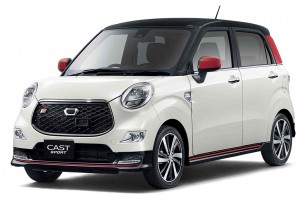
Toyota's acquisition of Daihatsu is allowing the maker to change up its small-car strategy as well as its hybrid powertrain technology.
As a part of a shift of its corporate strategy, Toyota Motor Corp. and its Daihatsu Motor Co. are preparing a new plan for selling small cars in various emerging markets around the world.
The Emerging Market Compact Car Co. will begin operations on Jan. 1, with the objective of developing “competitive ever-better cars” based on Daihatsu’s approach to manufacturing affordable, high-quality products.
As part of the re-organization, Toyota Motor Asia Pacific Engineering and Manufacturing Co. Ltd. in Thailand is being renamed Toyota Daihatsu Engineering and Manufacturing Co., Ltd. and becomes an entity under the new internal company.
The Emerging-market Compact Car Product & Business Planning Division, which is to span both Toyota and Daihatsu, conducts overall planning for products and business operations, including making proposals for the Toyota-brand vehicle product lineup for emerging markets and for overall strategy.
Daihatsu will have overall responsibility for product development for emerging-market compact cars, while the new internal company’s Emerging-market Compact Car Product Planning Division and Emerging-market Compact Car Quality Planning Division will have responsibility for final product development and quality for Toyota-brand vehicles.
(Toyota closing its Kentucky engineering center. For more, Click Here.)
The new company for supporting the production of Daihatsu-centered compact vehicles for emerging markets, according to the Toyota announcement.
For the first time, Toyota Motor Corp. plans to open up its hybrid powertrain technology to rivals, in a bid to boost sales and speed up the industry’s shift to lower-emission vehicles.
The world’s largest automaker said it would consider selling complete powertrain modules – engines, transmissions and other drive components — to its competitors.
The prospect of giving rivals access to “one-size-fits-all” powertrains comes as cars are increasingly dependent on computerized components, making it easier to design similar parts across model ranges. The industry has moved on from competing largely on mechanical engineering.
(Click Here for more about Toyota’s move to Texas.)
That trend will likely accelerate as automakers face pressure from regulators to further cut car emissions and develop more long-range electric vehicles. In addition, the shift will place Toyota to serve as a potential supplier of powertrains for self-driving cars and other autonomous vehicles.
For Toyota, this is a big departure from having a tightly-knit network of suppliers keeping much of their jointly developed technology exclusive so as to have an engineering competitive edge on rivals.
“Toyota suppliers produce a lot of technology which can only be used by Toyota,” Toshiyuki Mizushima, president of Toyota’s powertrain company, told reporters in Tokyo. “We want to change that to a system where we develop technology with our suppliers at an earlier stage … so they can make that technology available to non-Toyota customers.”
(To see more about Toyota adding high-powered Yaris, Click Here.)
Mizushima, who joined Toyota a year ago from group company Aisin Seiki Co., noted, for example, that past versions of Toyota’s hybrid system didn’t fit other automakers’ cars, limiting suppliers’ options to sell to non-Toyota customers.
